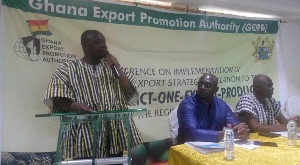 GEPA Officials at a workshop(File photo)
GEPA Officials at a workshop(File photo)
The Ghana Export Promotion Authority (GEPA) has organised a five-day new product development training for basket weavers at Asoegoom in the Bolgatanga Municipality of the Upper East Region.
The training, which was organised for about 120 selected weavers from the Basket Weavers Associations in Bolgatanga forms part of efforts to promote and ensure the production of competitive non-traditional and Made-in-Ghana products and to introduce the weavers to new product designs, empower them technically to produce well patronised products.
The GEPA, under the Ministry of Trade and Industry (MOTI) facilitates, develops and promotes Ghanaian exports and non-traditional products including handicrafts to accelerate economic growth.
Speaking on the final day of the training programme, Mr Martin Akogti, the Upper East and Upper West Regional Zonal Officer of the GEPA stated that aside the routine earnings from subsistence farming, petty trading, and rearing of livestock, basket weaving has been identified as major sources of employment among the people in the region.
Describing the Upper East Region as “home to myriads of authentic handicrafts products” he added that it was in support of this idea that the GEPA introduced “Bolga Basket” onto the international market to help reduce unemployment, especially among the youth, generate foreign exchange for the country and solve the frequent rural-urban migration.
The Zonal Officer stated that demands on the competitive markets were dynamic and the weavers needed to be equipped through periodic workshops and refresher programmes to ensure diversification in the production of quality products to meet global standards and tastes.
“The new product development will provide technical capacity building for the weavers to empower them to know the global trends in terms of regulations, market size and market requirements so that they could cope with the system and the anticipated changes on the global market.”
He added “The training would also assist in the establishment of effective stakeholder coordination mechanism for sector activities and improve livelihoods of the people, especially the rural communities.”
The Zonal Officer, who commended the trainers, identified inconsistent supply of raw materials from the Ashanti and Brong Ahafo Regions, especially during the lean season resulting in high cost of final products, the lack of electricity at some of the weaving centres among others as hindrances to the industry in the region.
Mr Akogti said his outfit was committed to supporting farmers in the region to cultivate the vetiver or elephant grass where the straw was obtained from to make raw materials readily available for weavers to increase their production and minimise cost.
Mr Bruce Bullu Liman, the Web Content Administrator of the GEPA told the weavers that modules were being put in place to ensure continued showcasing of their products on the international stage and assured them of more training programmes.
The participants were trained on new product development methods including mixing of both natural and chemical colours to get other colours aside the traditional colours and quality finishing among others.